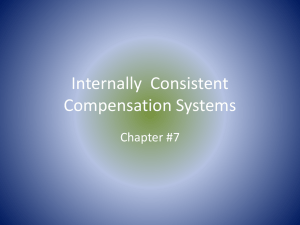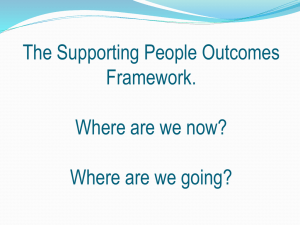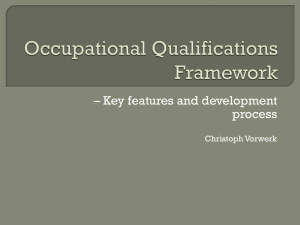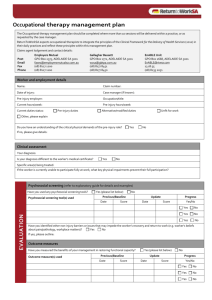Post-offer, Pre-placement - Connecticut Department of Labor
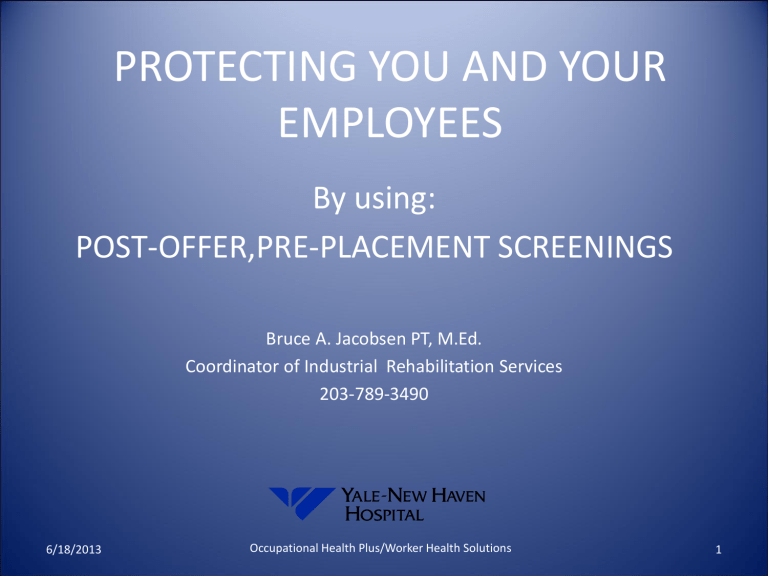
PROTECTING YOU AND YOUR
EMPLOYEES
By using:
POST-OFFER,PRE-PLACEMENT SCREENINGS
Bruce A. Jacobsen PT, M.Ed.
Coordinator of Industrial Rehabilitation Services
203-789-3490
Occupational Health Plus/Worker Health Solutions 6/18/2013 1
Also know as…
• Pre-work Screening, PWS
• Return to Work Screenings, RTWS
• Physical Demand Screenings, PDS
• Functional Capacity Evaluations, FCEs
• Limited functional Capacity Evaluations
• Ability Screenings
Occupational Health Plus/Worker Health Solutions 6/18/2013 2
• A Post-offer, Pre-placement screening is a screening that tests an applicant’s ability to perform the physical demands of a specific job.
6/18/2013 Occupational Health Plus/Worker Health Solutions 3
Purpose: Job Matching
• Definition: Matching an applicant’s and/or employee’s physical abilities to a job’s essential physical demand requirements.
• An objective measure to help hire the right people for a specific job.
Occupational Health Plus/Worker Health Solutions 6/18/2013 4
Job Match Grid
Essential Job Task,
Physical Demand Requirement
Floor to waist lift, 50-pounds
Floor to waist lift, 50-pounds
Floor to waist lift, 50-pounds
Applicant’s Abilities Job Match: Yes or No
25, pounds
50-pounds
100-pounds
No
Yes
Yes
6/18/2013 Occupational Health Plus/Worker Health Solutions 5
Post-offer, Pre-employment Screening
• Derived from a Functional Job Description.
• Specifically, the physical demands of the job.
• Department of Labor Physical Demands:
– Lifts, push & pull forces, carries, crawling , kneeling, crouching, climbing, hand grip forces, hand coordination activities (gross and fine motor).
Occupational Health Plus/Worker Health Solutions 6/18/2013 6
Additional Considerations
• Positive culture of safety.
• Ergonomic applications.
• Employee and Employer safety ownership.
• PDS are only a part of work safety programs.
• A snapshot of a person’s abilities
6/18/2013 Occupational Health Plus/Worker Health Solutions 7
Benefits of PDS
• Establishes a baseline level of physical abilities at time of hire.
• Reduction in first 90-day injuries (WorkWell
Systems, Inc.).
• More realistic return to work options if injured later on.
• Introduction to safe material handling; coaching.
Occupational Health Plus/Worker Health Solutions 6/18/2013 8
Benefits continued…
• Can identify if a screening failure is due to conditioning vs. pathologic vs. poor body mechanic issues.
• Considered non-discriminatory if based on the essential job functions.
• Helps to assure an injured employee is physically ready to return to work.
Occupational Health Plus/Worker Health Solutions 6/18/2013 9
Cost Considerations
• Adds to hiring cost, as an additional service.
• Based on the PDS pass rate of a specific job, more applicants may need to be screened.
(examples: CANs and EMTs).
– HR vs. safety/risk view points
• Again, helps identify if applicants have the essential physical abilities to perform the job.
• The idea is to help reduce WC costs.
Occupational Health Plus/Worker Health Solutions 6/18/2013 10
Legislation
• American Disability Act (ADA)
– 3 situations for testing
• Pre-employment
• Job Transfers
• Return to work clearance
– Work and non-work related injuries
• Equal Employment Opportunity Commission
(EEOC) looks at non-discriminatory application of the screenings.
Occupational Health Plus/Worker Health Solutions 6/18/2013 11
Physical Limiting Factors.
• Muscle weakness.
– Weak quadriceps
• Pathologies.
– osteoarthritis
• Poor body mechanics:
– bad habits
– Weakness
– pathologies
Occupational Health Plus/Worker Health Solutions 6/18/2013 12
Functional Capacity Evaluations (FCE)
• A standardized test of about 21 to 25 physical testing components.
• A physical exam is done prior to an FCE to help correlate findings for consistency of effort purposes.
• Range form 3 to 5 hours over 1 to 2 days.
• Looking to determine the employees maximum abilities.
• Observational criteria to help determine estimated work categories, i.e. frequent, occasional and rare work levels.
Occupational Health Plus/Worker Health Solutions 6/18/2013 13
FCE vs. PDS
• 3 to 5 hours
• Tests to maximal abilities
• More costly
• Done if no PDS is set up, mostly for RTW reasons.
• Often done at MMI to help quantify any permanent restrictions
• 15-60 minutes average
• Only as required within a work cycle
• Less costly
• Done for PWS, RTW and job transfers
• Not done for MMI restrictions
Occupational Health Plus/Worker Health Solutions 6/18/2013 14
Functional Job Descriptions (FJD)
• Required by both FCEs and PDSs
• Quantifies the physical demands of a job.
• A job analysis needs to be conducted to determine the physical demands of the essential functions.
• Strongly recommend employee and employer involvement during the development.
Occupational Health Plus/Worker Health Solutions 6/18/2013 15
